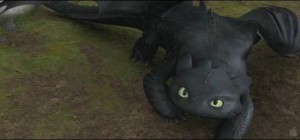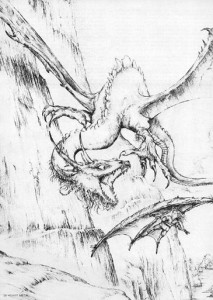Dragons. I don’t know why I’ve always been fascinated by them – some of it is just the word; shapes and sounds of words have an aesthetic value all their own, regardless of meaning.
That’s probably why I enjoyed BBC2’s the Adventure Game – it was quite a fun celebrity puzzle game but, also, the characters, planet and the currency were all anagrams or partial constructs of “dragon”. A good word and the “cleverness” of spotting anagrams – because everybody likes to feel a bit clever, right? I mean, that’s why we like quizzes. Only Connect is far more entertaining than University Challenge precisely because it is more vague, allowing for odd, intelligent and pattern-matching connections in the brain rather than degree level art history (or 12 year old science).
Anyway, dragons. The main problem, if such it is, I have is their representation in fantasy literature: they are almost always the villains or are just dumb monsters guarding treasure (the Hobbit, anyone?). From the first moment I saw a picture of one, and I have no idea when or what that would be, they were smart, wise and ostensibly the good guys. In my mind. They might be mischievous or guileful; tricky and sometimes untrustworthy but never actually villains. That just seemed wrong to me because they were clearly better than humans – humans always make the best villains in anything other than horror (where monsters are a must) because we understand that. People suck.

In the Lord of the Rings, orcs or trolls may be foot soldiers but the villains are really Saruman and Sauron – humans, effectively, if not technically. In Alien, the xenomorph is the monster but the real villain is the corporation – a very human concept. Dragons are just too sexy for that kind of treatment – which is probably why I like “How to Train Your Dragon” so much, even if the hero dragon of the piece looks too fish-faced (and even in this, the most impressively dragon-like dragon is a baddie).
 When I was a kid, I read a book called Dragonworld, partially because of the outstanding illustrations. In this, if I remember correctly, whilst the hero was a hobbit, in essence (Amsel?) the trick was to make the “bad” dragons a separate species – firedrakes. Dragons themselves weren’t so bad – though they were fearsome. Again, if memory serves, the main difference with firedrakes and dragons was that firedrakes had two legs and dragons, also larger, had four as well as being smarter and less bellicose. Even so, the firedrakes were drawn so well I had a bit of an issue with them being villainous… Even Harry Potter disappoints – the films beautifully render the dragons, as seems so easy now (e.g. the somewhat unusual use in “Reign of Fire”), but they remain dumb animals on film and in print.
When I was a kid, I read a book called Dragonworld, partially because of the outstanding illustrations. In this, if I remember correctly, whilst the hero was a hobbit, in essence (Amsel?) the trick was to make the “bad” dragons a separate species – firedrakes. Dragons themselves weren’t so bad – though they were fearsome. Again, if memory serves, the main difference with firedrakes and dragons was that firedrakes had two legs and dragons, also larger, had four as well as being smarter and less bellicose. Even so, the firedrakes were drawn so well I had a bit of an issue with them being villainous… Even Harry Potter disappoints – the films beautifully render the dragons, as seems so easy now (e.g. the somewhat unusual use in “Reign of Fire”), but they remain dumb animals on film and in print.
When I started playing Dungeons and Dragons, the same problem persisted: not only were dragons far too powerful for my D&D Basic, 2nd level character to take on, so I was unlikely to meat one without instant death by one of any number of breath weapons, but they were pretty much always just treasure hoarders and evil, to boot, even if the Monster Manual indicates a full range of alignments.
In the last campaign I ran, I perverted the very idea I loved. It ran something along the lines of there being key, “Prime” versions of various magical creatures and, specifically, three dragons. The players were going to find out a lot more about these, one of them having some blood relation, but whilst the online game lasted a long, long time, it never got to a point where they fully found out about them. The key element, their secret antagonist, was a dragon that had been bitten by the Prime werewolf and had become something altogether evil and transformed (I know, I know – but it’s D&D, OK!). This was The Mogradjinn, a word I liked so much that it became my online ID – primarily because “Andy” is usually taken (“dragon” probably is, too, but I’m not cool enough to try for that one, anyway), so it’s just easier to have something…odd.
Ursula le Guin’s Earthsea dragons are maybe the closest to my mind’s eye version, being smart and powerful, somewhat benevolent, if unconcerned with men. Thought they are still treasure hunters. But for any version like that, there are countless other mindless beasts.
And that, in the end, is the reason why I like dragons: they remain mysterious, like the concept of magic itself, and also just acompelling word; however they are presented by others as dumb or vain or evil – and I don’t pretend to have read everything dragonesque – there’s a version of them that remains mine. Unspoken, ill-defined, like a dream that waits, dragons are childhood, waiting in the wings. With wings.

